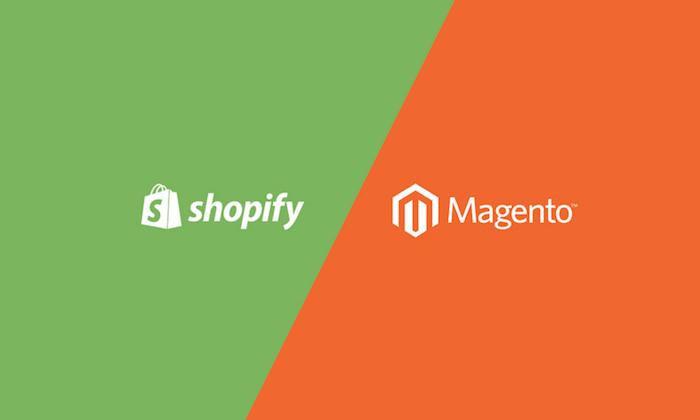How to Choose between Magento vs. Shopify: Command C Founder Talks with Clutch
Earlier this month, the expert review site, Clutch, asked Command C’s founder, Sara, to share her thoughts on two leading ecommerce platforms: Shopify and Magento. The site published the interview on May 10th, 2018, and we’re happy to reprint it here in full.
Background
 Introduce your business and what you do there.
Introduce your business and what you do there.
I am the founder of Command C. We are an e-commerce development and optimization agency. We do new site builds, but we also do a lot of rescue work, meaning that we take over projects that have already been built, for ongoing enhancement, maintenance, and support.
Challenge
What have you seen as one of the biggest challenges that clients are trying to address when coming to you?
For as long as I can remember, the most common complaint or struggle I’ve heard is a challenge with the current team in which the clients are working. Beyond this, many clients are still on legacy platforms that either no longer suits them or is not ideal for their situation. They have difficulty either managing the platform, or it’s too limiting for them.
Are there any factors that you think people need to consider before choosing a platform for an e-commerce store?
The first main point is making sure that we have a roadmap of the site spelled out. We have to make sure we’ve documented a very clear set of features and functionalities. Future roadmaps are also important to use for vetting the platform, making sure that it will support the company as it grows.
It’s also important to be realistic about the internal staff that will be working on the website. There are platforms that require more internal support than others. Having a realistic sense of internal resources is a big factor.

Solution
Can you give an introduction to both Magento and Shopify, and specify what makes them different from each other?
They’re really different platforms. At its core, Magento is a robust open-source platform with a ton of flexibility. With flexibility comes great responsibility. There is a lot to manage with Magento.
Shopify, on the other hand, is a software as a service (SaaS) platform. It’s a hosted solution, which is a core difference from Magento. Par for the course with hosted solutions, there are more limitations to what users can and can’t do on a platform. This is not necessarily a bad thing. Constraints can be a good thing, and the ones on Shopify are very specific. Not to say that it’s not a flexible solution, but, at their core, the natures of these two are different.
Is there an ideal client for Magento or Shopify Plus, respectively?
An ideal Magento client is a global merchant and/or a merchant with a ton of product customization, and a ton of administrative requirements.
An ideal Shopify client is one who has relatively straightforward products, and who is selling mainly in one currency. Multiple currency is achievable on Shopify, but it often requires some workaround and flexibility. The more currencies a shop has, the less Shopify will be a good fit. Though, I just attended Shopify Unite and they announced multi-currency on their roadmap. This is a game changer for the platform.
Are there any people to whom you wouldn’t recommend either platform?
This comes back to internal resources. I would not recommend Magento for a team with fewer than 2 dedicated people managing the site. This doesn’t include an entrepreneur with 10 different jobs. Magento really needs people focusing solely on it. A lean team that needs a super friendly admin is a great fit for Shopify. I wouldn’t recommend Magento for a team with a lot of constraints.
Is it necessary to have a technical background in order to maintain a Magento or Shopify site?
Magento, yes. Shopify, much less so.
If people don’t have an internal technical team, is this type of collaboration something they should be looking for?
Absolutely. This matter is also cultural. If the team has a solid grasp of technicalities, and they do have a technical background, then Magento is a better fit. If this is not the background of the team from a cultural perspective, then Shopify can oftentimes be a better fit.

Features
Are there any particular features of Magento that you find most impressive, or that you think make it stand out?
I appreciate the overall robustness and flexibility of the platform. It’s great for multicurrency, as well as for both B2B and B2C clients. It’s ideal for clients who have a ton of customization, or who have products with a high number of attributes. These are the top features of Magento.
Are there any particular features of Shopify that you find most impressive, or that you think make it stand out?
The overall takeaway with the platform is its overall ease of use. They changed the industry standard in this regard. There are also features like Flow and Launchpad, that enable workflow automation and scheduling advanced sales. These are extremely innovative and powerful tools that merchants can leverage to really automate a lot.
Are there any improvement areas for either platform or something that could be added to make the platform even better?
The robustness of the platform that I mentioned makes it a beast to deal with. It’s a matter of assets becoming liabilities. Magento 2 still has a lot of bugs, and our devs are frequently pointing out issues to the Magento team, that they hadn’t even heard of yet. This is the biggest point of concern or improvement area at this time.
I am sure that anyone familiar with Shopify would have the same response to this question, namely the challenge of achieving seamless multicurrency.
Is there anything that someone can do to ensure that their Magento or Shopify site is as secure as possible?
Shopify is pretty secure right out of the gate. This is one of their biggest selling points, in my opinion. This is also the benefit of a SaaS solution, where the company is responsible for managing the platform’s security and PCI compliance. There are also apps in the ecosystem, that can take security even further, into fraud protection and similar things.
With regards to Magento, there is a lot more responsibility and liability on the merchant to keep their platform secure. The top activities I recommend for doing so are—first and foremost—keeping the site up-to-date with patches, ensuring that the host is PCI-compliant, leveraging complex passwords and changing them frequently, and ensuring that the SSL certificate is current.

What is the cost of building a basic e-commerce site, and where could it start to get more expensive?
Magento is costlier to build from a development standpoint. There’s simply more to work with, and it’s more complex than Shopify. From a cost of the platform perspective, the client is responsible for hosting the site, in the case of Magento. With Shopify Plus, we have a monthly fee that starts at around $2,000. It’s difficult to make a straight comparison, given that each platform has aspects that make it more or less expensive, and those aspects are different between the two platforms.
Where costs start to increase is when there is a lot of customization to the platform. Integrations and custom applications that are not out-of-the-box to either platform is where the costs start to add up.
Is there anything else you’d like to add?
One thing I’ve noticed from doing this for as long as I have been is that if the client is clear about their needs, the platform choice—at least between Shopify and Magento—ends up being an easy one to make. It becomes clear quickly which clients belong on which platform. It gets trickier when choosing between platforms like BigCommerce and Shopify, ones that are more similar in nature, and that have one or two distinguishing features that really make them different from one another. When it comes to choosing between Magento and Shopify, it’s not that difficult for us to help diagnose which is a better fit quickly.
Overview
We have five additional questions. For each of these, we ask that you rate Shopify and Magento on a scale of 1 to 5, with 5 being the best score.
How would you rate each platform for its functionality and available features?
Magento – 5
Shopify – 5
How would you rate them for ease of use and ease of implementation?
Magento – 2
Shopify – 5
How would you rate the platforms for support, as in the response of their team, and the helpfulness of available resources online?
Magento – 2
Shopify – 5
How likely are you to recommend them to a friend or colleague?
Magento – 4
Shopify – 5
How would you rate the platforms for overall satisfaction?
Magento – 4
Shopify – 5
